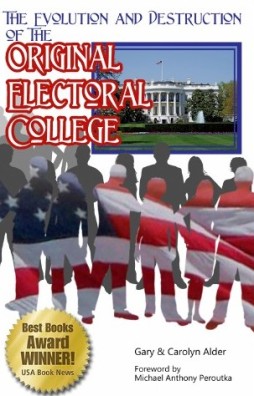A Page from Our Book
Page 7 – Terms and Usage
In this book, we capitalize certain terms to designate a specific usage. The same terms in lower case indicate general usage; such as constitution, representative, elector, and electoral college. Representative (capitalized) means a member of the United States House of Representatives. Elector (capitalized) refers to an Elector for the President of the United States. Founders are those who laid the foundation for the nation. Framers are those who designed the Constitution.
The term general government was used by the Framers to indicate the national level of a federal government such as the United States under the Constitution. The term seemed less inflammatory to them than national government which could be considered a consolidated government.
The term federal government is commonly used today to refer to the national level of government. Unfortunately, the nature of our so called federal government is so far from federal that it resembles a dictatorship or an oligarchy more than a league of states. For this reason it would be counterproductive to use the terminology. While we extensively use the concepts of federalism as outlined in the Constitution in this book, we avoid using the term federal government rather than hazard miscommunication.
The term national government can validly be used to refer to either the level of government or to the nature of government. The term national government could therefore refer to a government which is federal in nature rather than consolidated. We use it in this book in the sense of the level of government. In Federalist No. 39 James Madison superbly demonstrates the combination of these different federal and national natures in our original government as outlined in the Constitution.
The term constitutional federalism refers to the unique federal system created by the Constitution. Constitutional Federalism is a way of describing the complex constitutional representative republic that was designed by the Framers to share power between national and state governments. The term is used in contrast to the simple federation created by the Articles of Confederation but also in contrast to a consolidated national government or simple republic.
The term electoral college system in this book refers to the selection process for the President of the United States as outlined by the Constitution. One of the major components of the system is the college or group of Electors known as the Electoral College. The system, however, is more important than any of its components or even more than the sum of all its components. It is often referred to by the name of its unique component, the Electoral College. When a more rigorous distinction is required we explicitly use the term Electoral College System.
The term electoral college in this book primarily refers to the Electoral College System. As the context may require, we will sometimes refer to the Electoral College as all of the individual Electors. In discussions and debates during the Constitutional Convention, the Framers did not use the term electoral college but rather spoke of Electors as a group, even before they decided how to define the responsibilities of that group in the system they were designing.
The term elector refers to an individual who is qualified and authorized to elect someone to office. Technically all voters are electors. (see US Constitution Article I Section 2 Clause 1) However, there is a special position in the United States designated to vote for a presidential candidate which nowadays is the common way we use the word elector—a presidential Elector. (see US Constitution Article II Section 1 Clause 2) Before popular elections were held in Europe and other areas of the world, various countries designated specific groups of government and church officials as delegates to elect other government officials. In those electoral college settings, electors differ from those we discuss in this book in that they are permanent in nature and usually are existing government officials.
The term popular vote system is simple majority rule. The term is used in this book as a contrast to Constitutional Federalism in general and specifically the Electoral College System for electing presidents. Popular vote generates political parties and is the basis for representative democracies, or simple republics which are consolidated national governments. It is the common system used by democracies around the world. Popular vote is the de facto system we currently use in the United States—not the system the Framers designed.


